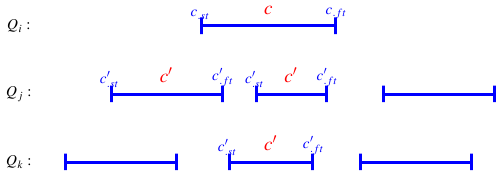Model:
Consider $n$ independent, parallel $M/M/1$ queues with identical arrival rates $\lambda$ and service rates $\mu$. For each $M/M/1$ queue, we use the FCFS (First Come First Served) discipline and if there is some customer in service, no more customers can enter it.
For each customer $c$, its start time, finish time, service interval are denoted by $c_{.st}$, $c_{.ft}$, and $[c_{.st}, c_{.ft}]$, respectively.
Problems:
I want to study some concurrency-related problems in such queueing system in the long run. Specifically,
(1). Given two different $M/M/1$ queues $Q_i$ and $Q_j$ and a customer $c$ served by $Q_i$, what is the probability that it starts during the service interval of customer $c'$ served by $Q_j$ (i.e., $c_{.st} \in [c'_{.st}, c'_{.ft}]$)?
Note that $c'$ will be unique if $c_{.st} \in [c'_{.st}, c'_{.ft}]$ holds, as shown in the following figure.

(2). On the other hand, given a customer $c$ served by $Q_i$, what is the probability that there are exactly $m$ customers each of which (denoted $c'$) finishes during the service interval of $c$ (i.e., $c'_{.ft} \in [c_{.st}, c_{.ft}]$)?
Note that there may be more than one customer in $Q_j$ ($Q_j \neq Q_i$) satisfying the condition $c'_{.ft} \in [c_{.st}, c_{.ft}]$, as shown in the following figure.

References related to similar problems are also well appreciated. Thanks in advance.
